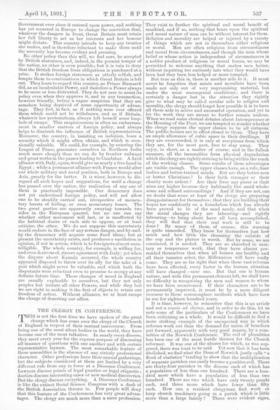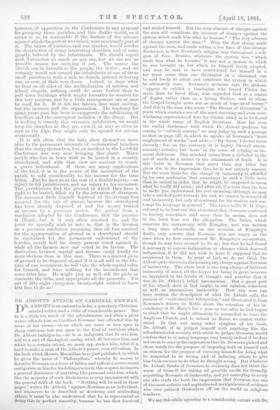THE CLERGY IN CONFERENCE. T HIS is not the first time
we have spoken of the great change which has come over the clergy of the Church of England in respect of their mutual intercourse, From being one of the most silent bodies in the world, they have become one of the most talkative. In nearly every diocese, they meet every year for the express purpose of discussing all'manner of questions with one another and with certain representative laymen. The most remarkable feature of these assemblies is the absence of any strictly professional character. Other professions have their annual gatherings, but the subjects considered at them are limited by a very different rule from any in force at a Diocesan Conference. Lawyers discuss points of legal practice or legal etiquette ; doctors discuss interesting cases or new medical discoveries. But the clergy discuss everything. A Diocesan Conference is like the extinct Social Science Congress with a dash of the British Association thrown in. Few people will deny that this feature of the Conferences has very great advan- tages. The clergy are much more than a mere profession. They exist to further the spiritual and moral benefit of mankind, and if so, nothing that bears upon the spiritual and moral nature of man can be without interest for them. Religion and morality are helped or injured by a variety of things which are not in themselves either religious or moral. Men are often religious from circumstances and moral from circumstances, and though the man whose belief or whose action is independent of circumstances is a nobler product of religious or moral forces, we may be permitted to welcome anything that makes men better, without inquiring too curiously into what they would have been had they been less helped or more tempted. But true as this is, there is another side to it. It must never be forgotten that saints and moralists have been made not only out of very unpromising material, but under the most uncongenial conditions ; and there is certainly a danger lest in the attention they rightly give to what may be called secular aids to religion and morality, the clergy should forget how possible it is to have all these aids in active and successful operation, and yet to let the work they are meant to further remain undone. When we read some clerical debates about Intemperance or the Housing of the Poor, we are tempted to wonder whether the clergy suppose the upper classes to be all virtuous. The public-houses are in effect closed to them. They have an ample allowance of cubic space in their dwellings. If they are overcrowded, it is only at receptions from which they are, for the most part, free to stay away. They enjoy, in short, as a matter of course, and in the fullest measure, all the immunities from physical degradation which the clergy are rightly striving to brill g within the reach of the working classes. Some results of these advantages are visible enough. The upper classes have, as a rule, finer bodies and better-trained minds. But are they better men or better Christians ? Is their faith stronger or their charity more ardent ? Are their lives any purer or their aims any higher because they habitually live amid whole- some and refined surroundings ? And if they are not, can we doubt that some at least of the clergy are preparing disappointment for themselves ; that they are building their hopes too confidently on a foundation which has already been proved to be of the sand sandy, and that when the social changes they are labouring—and rightly labouring—to bring about have all been accomplished, they will find that their real work is still to be done ? By many of them, of course, this warning is quite unneeded. They know for themselves just how much and how little the cleansing the outside of the cup and the platter is worth. But by some, we are convinced, it is needed. They are so absorbed in sani- tary or temperance work, that they have almost per- suaded themselves that when all houses are healthy and all their inmates sober, the Millennium will have really come. They are so far right that when these vast reforms have been effected, every factor in the human situation will have changed—save one. But that one is human nature, and with this permanent element left, we shall have no difficulty in recognising the men and women to whom we have been accustomed. If their characters are to be permanently improved, it must be by a more diligent recourse to those commonplace methods which have been in use for eighteen hundred years. It is time, however, to remember that this is an article and not a concio ad clerurn, and in order to do this, let us note some of the particulars of the Conferences we have been criticising as a whole. It would be difficult to find a more striking example of the unexpected way in which reforms work out than the demand for union of benefices put forward, apparently with very good reason, by a com- mittee of the Norwich Conference. The evil of pluralities has been one of the most fertile themes for the Church reformer. It was one of the abuses for which, as was sup- posed, there was least to be said. Yet now that it has been abolished, we find what the Dean of Norwich justly calls'' a flood of statistics" tending to show that the multiplication of separate parishes can easily become a positive evil. There are thirty-four parishes in the diocese each of which has a population of less than one hundred. There are a hun- dred more which have a population of less than two hundred. There are two which have only twenty people each, and three more which have fewer than fifty each. How can a resident clergyman find work or keep church machinery going in a perish which is little more than a large family ? There were evident signs, however, of opposition in the Conference to any proposal for grouping these parishes, and this dislike would, as it seems to us, be reasonable if the feature of the scheme against which the protest was raised, were necessarily part of it. The union of parishes, said one speaker, would involve the destruction of many interesting churches, and of some greatly beloved by the inhabitants. We should regret such destruction as much as any one, but we can see no possible reason for carrying it out. The nearer the church can be brought to the people, the better ; and we certainly would not compel the inhabitants of one of these small parishes to walk a mile to church, instead of having one, as now, at their very doors. Indeed, in days when we hear on all sides of the multiplication of mission and school chapels, nothing could be more foolish than to pull down buildings which might hereafter be wanted for this very purpose, and by a little arrangement can at once be used for it. It is not the fabrics that want uniting, but the incomes and the organisation. The tendency for many years past has been to exaggerate the subdivision of benefices, and the consequent isolation of the clergy. But in seeking to remedy this excessive subdivision, we would keep the churches as they are, even if, as may so often be seen in the Alps, they might only be opened for service occasionally. It is not often that the laity show themselves more alive to the permanent interests of ecclesiastical benefices than the clergy themselves, but an incident in the Lichfield Conference was very near bringing this about. Many people who live in town wish to be buried in a country churchyard, and with that view are anxious to secure a grave beforehand. If there are many applications of the kind, it is in the power of the incumbent of the parish to add considerably to his income for the time being. But he does so at the cost of a double injury,—an injury to his parishioners, and an injury to his successor. The parishioners find the ground in which they have a right to be buried, filled up by the intrusion of strangers. The successor finds himself deprived of the average fees received for the sale of graves, because the churchyard has been already disposed of and the money treated as income by a previous rector. We gather from a resolution adopted by the Conference, that the practice is illegal; but it is very often resorted to, and the point we specially wish to note is, that in the division on a previous resolution proposing that all fees received for the appropriation of ground in a churchyard should be capitalised for the permanent endowment of the benefice, nearly half the clergy present voted against it, while all the laymen save one voted in its favour. The distinction between capital and income could hardly be more obvious than in this case. There is a limited piece of ground to be disposed of, and if it is all sold in the life- time of one incumbent, he will take the whole capital value for himself, and leave nothing for the incumbents that come after him. He might just as well sell the glebe or commute the tithe, and appropriate all the proceeds. Yet out of fifty-eight clergymen, twenty-eight wished to leave him free to do so !



































 Previous page
Previous page